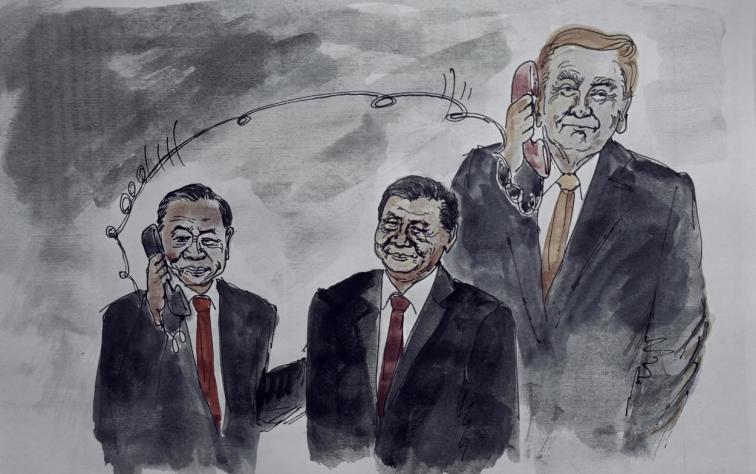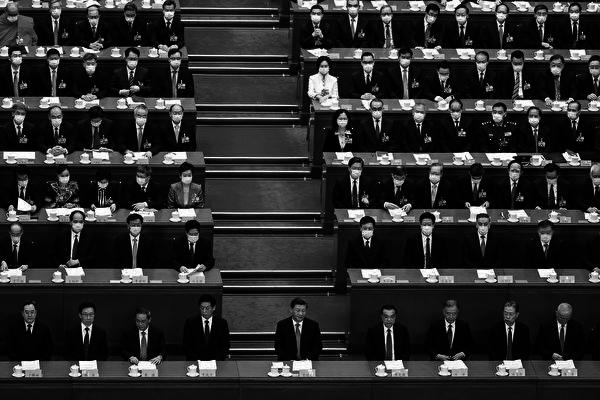On April 19, 2023, (from left) Wang Yi, Xi Jinping, and Qin Gang met with the visiting President of the Gabonese Republic (not pictured) in Beijing. (Ken Ishii-Pool/Getty Images)
[People News] Rumours are flying about Chinese Communist Party (CCP) International Department Minister Liu Jianchao being taken into custody. Sources told foreign media that in early August, authorities searched his residence. His situation may be more serious than that of former Foreign Minister Qin Gang. As usual, the CCP has kept silent, and multiple theories about why Liu was taken away are circulating online.
Recently, multiple foreign outlets reported that Liu Jianchao had been detained. On August 10, The Wall Street Journal cited insiders saying that after returning to Beijing from an overseas trip in late July, Liu was taken away for questioning.
Reuters, citing five informed sources, reported that Liu was detained in early August, and two of them confirmed that authorities searched his home around that time.
According to an August 12 article in Radio France Internationale (bylined André), Liu’s case may be more serious than Qin Gang’s. The piece compared the two and found striking similarities:
Both were diplomats favoured by Xi Jinping, both were promoted to the 20th Central Committee, and both disappeared while serving as ministers.
The circumstances of their disappearances were also similar. Qin Gang vanished just months into his tenure as foreign minister. Liu, once seen as a top contender to replace Qin, and later considered a possible successor to Wang Yi, has now also abruptly disappeared.
The reasons for Liu’s disappearance remain unclear, and the authorities have offered no explanation.
On August 8, online rumours claimed that Liu was detained over suspected leaks of state secrets, with some saying he helped Chinese tycoons move assets overseas.
Veteran journalist Akio Yaita, formerly the Beijing correspondent for Japan’s Sankei Shimbun, recalled his interactions with Liu Jianchao when Liu served as Foreign Ministry spokesperson. Yaita noted that foreign correspondents classified ministry spokespeople as either “moderates” or “hardliners,” based on their choice of words and attitude toward foreign reporters. In his view, both Liu and Qin belonged to the “moderate” camp.
Analysing Liu’s detention, Yaita argued that even if Liu were corrupt, the amount involved would likely be small, and he had little motive to leak secrets. “The most likely explanation,” Yaita said, “is that he was taken down by political rivals.”
Yaita believes Xi Jinping’s foreign policy has long oscillated between “coordinating with the U.S.” and “taking a hard line against the U.S.” Liu may have been a casualty of this internal struggle between two policy camps. His downfall suggests the “hardliners” have now gained the upper hand, meaning U.S.-China tensions are unlikely to ease anytime soon.
RFI’s analysis suggested that Liu’s troubles may be connected to the question of who will succeed the ageing Wang Yi as foreign minister. After Qin’s removal, rumours swirled that Liu would replace him, but instead, Wang Yi returned to the post. Now, with Liu again rumoured as a top candidate for the role, this may have worked against him — possibly being seen as a threat to Wang Yi.
Yaita also pointed out that in the CCP, the two most important ministries are Defence and Foreign Affairs. The repeated downfall of senior officials in both signals turmoil at the very core of power. △











News magazine bootstrap themes!
I like this themes, fast loading and look profesional
Thank you Carlos!
You're welcome!
Please support me with give positive rating!
Yes Sure!